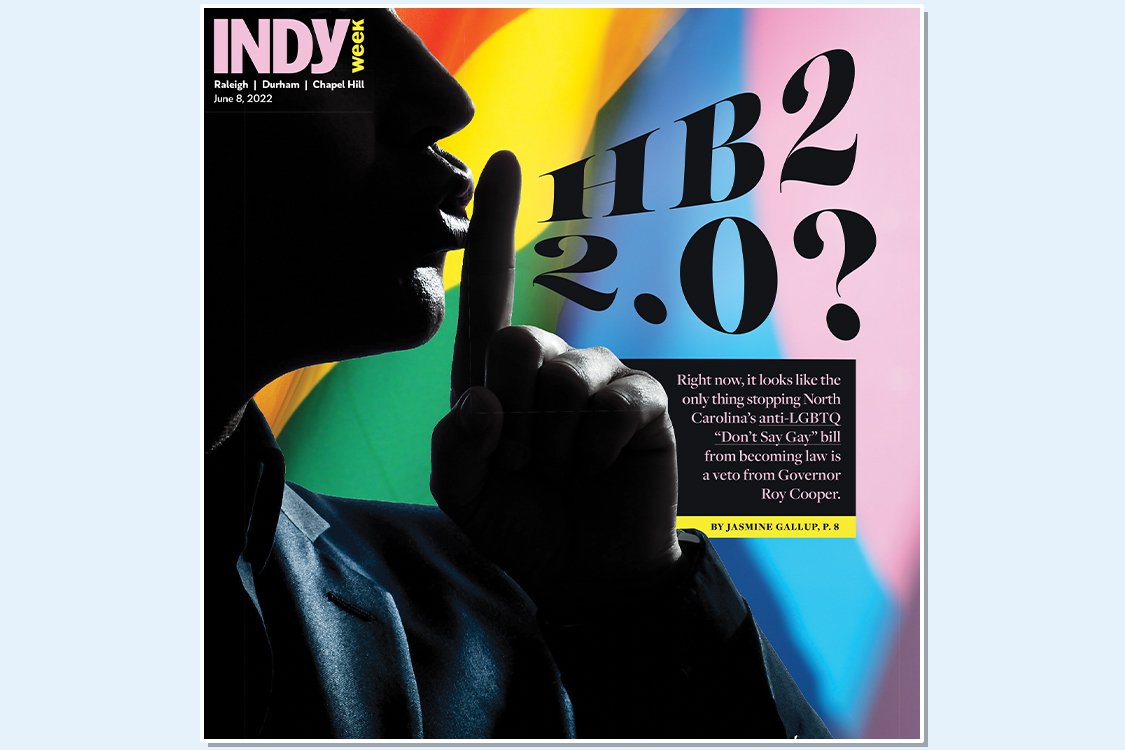
Another year has gone by, and the Triangle continues to grow, and continues to recover, albeit rather slowly, from the impacts of the COVID-19 pandemic. And while it’s certainly the end of the beginning of the pandemic, it remains to be seen if it’s also the beginning of the end.
As we’ve reported in the last weeks, Durham and Raleigh have opened social districts to get more foot traffic on their downtown streets. And as we report today, the housing market looks, finally, to be cooling down. But some of the local issues that predate the pandemic—outsized growth resulting in gentrification and displacement, gun violence, and police brutality—persist. And some issues, such as addressing workers’ rights and responding to an alarming rise in anti-LGBTQ+ sentiment, have taken on a new sense of urgency.
Here at the INDY, we’ve been watching life unfold across our Triangle communities and chronicling it all. Join me as I take a look back on some of our writers’ most impactful work from the past year.
Workers are organizing, unionizing, and demanding better wages and treatment
We started out the year in March looking at the efforts of workers at a local Starbucks to form a union—the first store in North Carolina to try to do so—and ended it with reporting on labor rights groups demanding better protections for frontline workers who have to work in person during public health crises such as the COVID-19 pandemic. In between, we saw a strike at a local Planet Fitness and demands from housekeepers at UNC-Chapel Hill for better treatment and pay. North Carolina, routinely, is recognized as the worst state in which to work, and it is one of the most, if not the most, anti-union states in the nation as well as the one least amenable to workers’ rights and protections. Still, there was some notable progress this year. In February, Duke University Press employees won their union election. In November, service workers from across the South launched a cross-sector union to protect their interests on the job. And this month, UNC administrators agreed to raise wages for its housekeepers, groundskeepers, and waste and recycling services staff. We have no doubt the fight for fair pay and treatment will continue in 2023.
The service industry adapts
Along with more pandemic-related closings, some new and exciting openings, and an effort to bring people back to the Triangle’s still-quiet downtowns, we’ve seen the service industry take steps to adapt following a tough three years. Crowdsourcing review behemoths like Yelp are increasingly losing their relevance during a time when everyone’s just struggling to stay afloat, writer Lena Geller reported back in January. And food service industry stalwarts are pivoting to new models, such as meal prep entrepreneur James Hunt’s quest to make the service industry healthier; Matt Northrup’s gourmet approach to takeout; Mei Li’s “waste not, want not” philosophy; and Trevor Spear’s approach to modular farming.
Housing and development in Raleigh
As rents and housing costs skyrocketed over the last year (rents in Raleigh rose by an average of 14 percent and home prices rose by around 22 percent), Raleigh’s city council introduced a “missing middle” policy that largely deregulated development across the city. In other words, it’s easier for developers to build more densely now, in more places, though critics say the policy doesn’t have explicit stipulations for procuring more affordable housing. And, as we saw in the city council elections that resulted in a close mayoral race and a developer-friendly council member losing his seat, the discontent among residents around the city’s policies guiding Raleigh’s growth strategy is discernible. In January, Jasmine Gallup reported on the development pressures on the neighborhoods located around the edges of Dorothea Dix Park—some of the last affordable neighborhoods in Raleigh—and the displacement residents living there face. Then there’s the issue of city-owned land near Moore Square and whether the city council is going to use it for affordable housing. This summer, transit overlay districts became a point of contention, with many fearing displacement of people already living in naturally occurring affordable housing along these transit corridors. And a rare compromise over the preservation of Seaboard Station alongside a new two-tower mixed-use complex off of Peace Street provides a good blueprint for how the city can maintain its old buildings in the future.
Reform in the Raleigh Police Department
The first year on the job for Raleigh police chief Estella Patterson, in whom many placed their hopes for real changes within the department, opened with a tragedy. Raleigh officers shot and killed Daniel Turcios in January in front of the man’s family following a rollover car wreck on a busy Raleigh highway. Another man, Reuel Rodriguez-Nunez, died after Raleigh police shot him outside a police station in May. No officers were charged in either incident. When it came time to make the budget, criminal justice activists said they didn’t see a lot of improvement in the department since the Black Lives Matter demonstrations of 2020, where protesters, such as 17-year-old Nyee’ya Williams, were brutalized at the hands of police. The Raleigh City Council gave the RPD an $8 million budget increase anyway. And recent reporting on a lawsuit brought by a pair of families whose homes Raleigh police violently raided with the use of a no-knock warrant has cast fresh doubt on the department’s capacity for meaningful change. We haven’t written Patterson off just yet, but we’ll continue to watch the department closely for indications of reform.
Gentrification and displacement in Durham
Raleigh isn’t the only city in the Triangle facing development pressures. Durham residents, especially Black residents, are seeing the gentrification of their neighborhoods and their own ongoing displacement from the communities that they’ve called home for generations. This year, writer Thomasi McDonald chronicled plans for the redevelopment of the historic Hayti community and the tension between a plan favored by many neighbors—a hub for housing, commerce, and education dubbed Hayti Reborn—and a plan to redevelop Fayette Place into affordable housing selected by the Durham Housing Authority. It’s not just Hayti that’s at risk. Residents worry over the future of Walltown as the new owners of Northgate Mall plan for redevelopment of the property without adding any new housing to speak of. And in October, we were the first outlet to report on several residents who received what amounted to eviction letters from the Eno River Association, a nonprofit that wanted to use their homes to house Eno River State Park rangers. The ERA said last month it has now tabled those plans. One other bright spot: a pair of affordable housing developments in Bragtown could slow the exodus of Durham’s Black families.
Gun violence in Durham
Though some violent crime in Durham is down over previous years—there were fewer total shootings this year and fewer individuals shot than in 2021 and 2020—it’s not much consolation to the family members and friends of 39 victims, including children, killed by guns in Durham in 2022. Writer Thomasi McDonald has reported on local officials’ seeming inability to deal with the criminal gang and drug activity plaguing the city’s young people and fueling the violence. Meanwhile, Durham mayor Elaine O’Neal, a former judge, acting out of desperation perhaps, is meeting with gang members to try to get a handle on the issue. In June, the men responsible for killing Z’yon Person, who would have turned 12 this year, were found guilty; but not much has changed since the boy’s accidental gunfire killing in 2019, McDonald wrote. Initiatives creating violence interrupters and new spaces for the city’s young people are hoped to help. But it’s becoming clear that addressing the scourge of gun violence in any city troubled by it is increasingly out of the hands of the local leadership; look no further than this year’s mass shooting in Raleigh for proof of that.
Efforts in Wake County to ban LGBTQ+ books
This year marked the beginning of what looks to be a disturbing new, or maybe just resurrected, trend in Wake County’s library and school systems. Writer Jasmine Gallup has followed the controversy since January, when she reported on a school board meeting besieged by angry parents demanding that certain LGBTQ+-themed titles be removed from school and classroom shelves. Thanks to a united progressive front on Wake County’s school board (which, mercifully, emerged from the November election intact), would-be book banners have met with little success. But the county’s library system is another story, as administrators initially were successful in getting the well-known young adult graphic novel Gender Queer off of shelves, prompting, as Gallup reported in February, an internal investigation and revisions of the library system’s collection and book challenge policies, as Gallup later reported in March. In September, Wake libraries came under scrutiny again when they ordered the anti-trans children’s book Johnny the Walrus.
Rising anti-LGBTQ+ sentiment
It’s been a scary and depressing time to be part of the LGBTQ+ community this year, and the Triangle hasn’t been insulated from anti-gay, anti-trans national trends. While largely shunned by Durham residents, the anti-LGBTQ+ Pioneers church and business space, on which Sarah Edwards first reported for the INDY last November, is still up and running in its location on Geer Street. Pioneers Durham did, however, receive a stern rebuke earlier this month from the North Carolina Conference of the United Methodist Church, in which the NCCUMC apologized to the community for its “action and inaction” related to Pioneers Durham. In June, we reported on the Town of Holly Springs’ refusal to recognize Pride Month and its resistance to developing a nondiscrimination ordinance. And in September, we highlighted a devastating report that found high numbers of young LGBTQ+ people living in the South struggling with their mental health. It doesn’t help matters that, with Republicans now holding a supermajority in the state senate post–midterm elections (not to mention notoriously bigoted Lt. Gov. Mark Robinson gearing up for a gubernatorial run), there likely will be a whole rash of anti-LGBTQ+ legislation in the works in the years ahead of us.
Support independent local journalism. Join the INDY Press Club to help us keep fearless watchdog reporting and essential arts and culture coverage viable in the Triangle.
Comment on this story at backtalk@indyweek.com.








